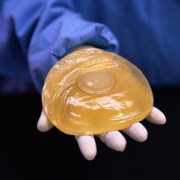 Photo: Getty Images
Photo: Getty Images
Women who live in Europe, South and Central America continue to get confusing messages from their respective governments about their breast implants. The implants made by Poly Implant Prosthesis (PIP) were manufactured by a French medical company, which is now non-operational.
The company made poor quality, cheap grade implants of silicone, but luckily these implants never made it to the United States.
In France alone, data indicate that at least 30,000 French patients (mostly women) will need to have the implants taken out, leaving the government to pay for the cost of removal.
However, response from other governments is not consistent. In other European and South American countries, some women have been advised to have the implants removed at their own expense.
In other cases, the government has offered to pay for the cost of removal only if the implant shows signs of leakage or is obviously defective. In most Central American countries, patients have simply been told to have their implant checked at their own expense.
In Brazil and Mexico the governments have advised women to have their implants evaluated, but have not recommended removal. In Colombia, the government has promised to pay for the removal if there is an indication.
In Britain, the National Health Service has advised against routine removal, and only those which are found to be defective will be eligible for free removal. In Holland, the government has advised women to have their PIP implant removed.
The cost of removal is enormous but for women, it is the disfigurement and emotional torment that weighs a heavy burden.
Latest estimates indicate that PIP sold close to 400,000 implants worldwide before going out of business several years ago. American patients who had PIP breast implants done abroad because the price was cheap should be aware that they are at great risk and should see a plastic surgeon.
In the last few years, complaints about these implants have been rising. They have included breast pain, inflammation, irritation and asymmetry of the breast.
Many other implants leaked or burst because of the inferior grade silicone. Several patients have also died of cancer in France.
Recently the FDA indicated that a type of lymphoma was a cause of death in some of these women with silicone breast implants. Fortunately, the number of cancers have been very few and no definite link has yet been established to the silicone.
For women, breast implants can improve their body image, personality and enhance their sex life. But consumers have to know that every prosthesis, like an implant, only lasts for 10-15 years.
There is no implant that lasts a lifetime. At some point in time, the implant has to be removed, because like any mechanical item, wear and tear will cause deterioration.
So while plastic surgery is a great way to enhance self-esteem and confidence, it also carries unknown risks, especially when cheap quality materials are used. In my view, this alone is reason not to seek any type of health care abroad.
Sources:
1. PIP breast implants: Women march on private clinics. Retrieved Jan. 15, 2012.
http://www.bbc.co.uk/news/health-16561913
2. PIP breast implants: European Commission says reform needed. Retrieved Jan. 15, 2012.
http://www.bbc.co.uk/news/health-16543321
3. Anaplastic Large Cell Lymphoma (ALCL) In Women with Breast Implants: Preliminary FDA Findings and Analyses. U.S. Department of Health & Human Services. January 2011. Retrieved Jan. 15, 2012. http://www.fda.gov/MedicalDevices/ProductsandMedicalProcedures/ImplantsandProsthetics/BreastImplants/ucm239996.htm
Reviewed January 16, 2012
by Michele Blacksberg RN
Edited by Jessica Obert





Add a CommentComments
There are no comments yet. Be the first one and get the conversation started!